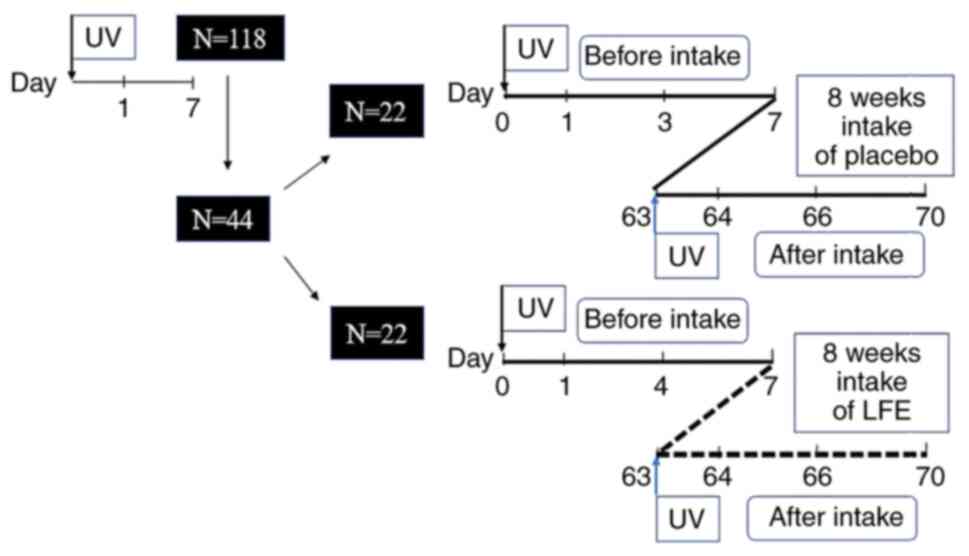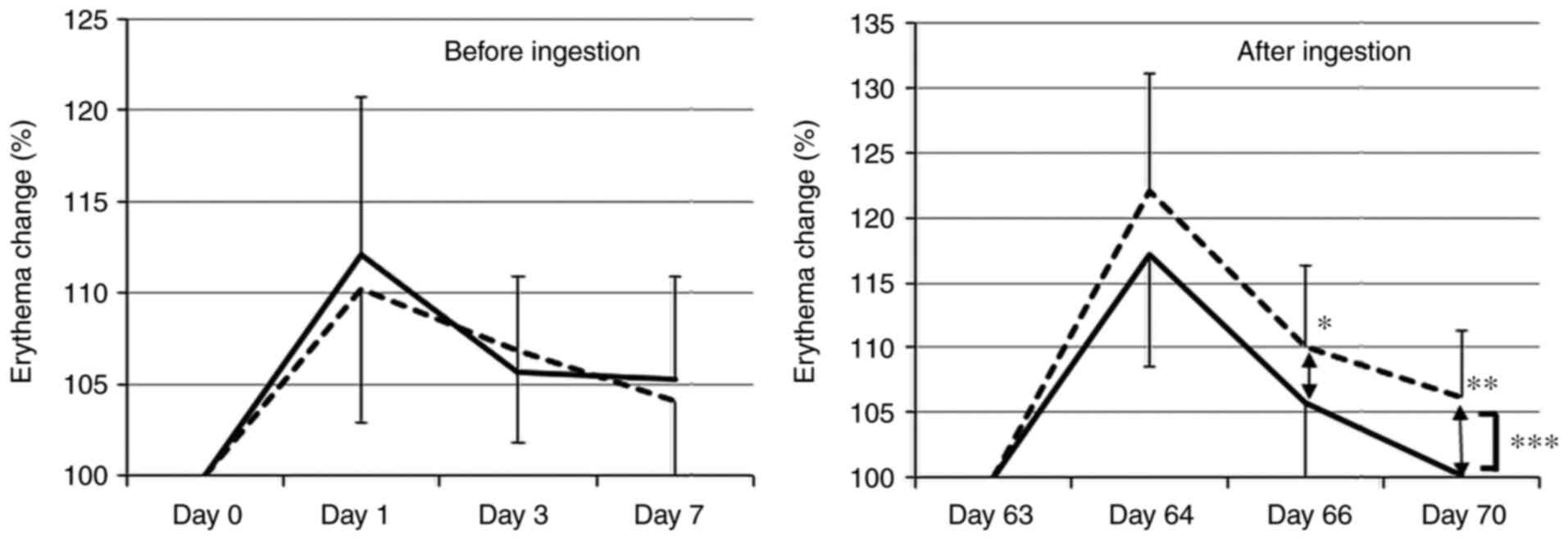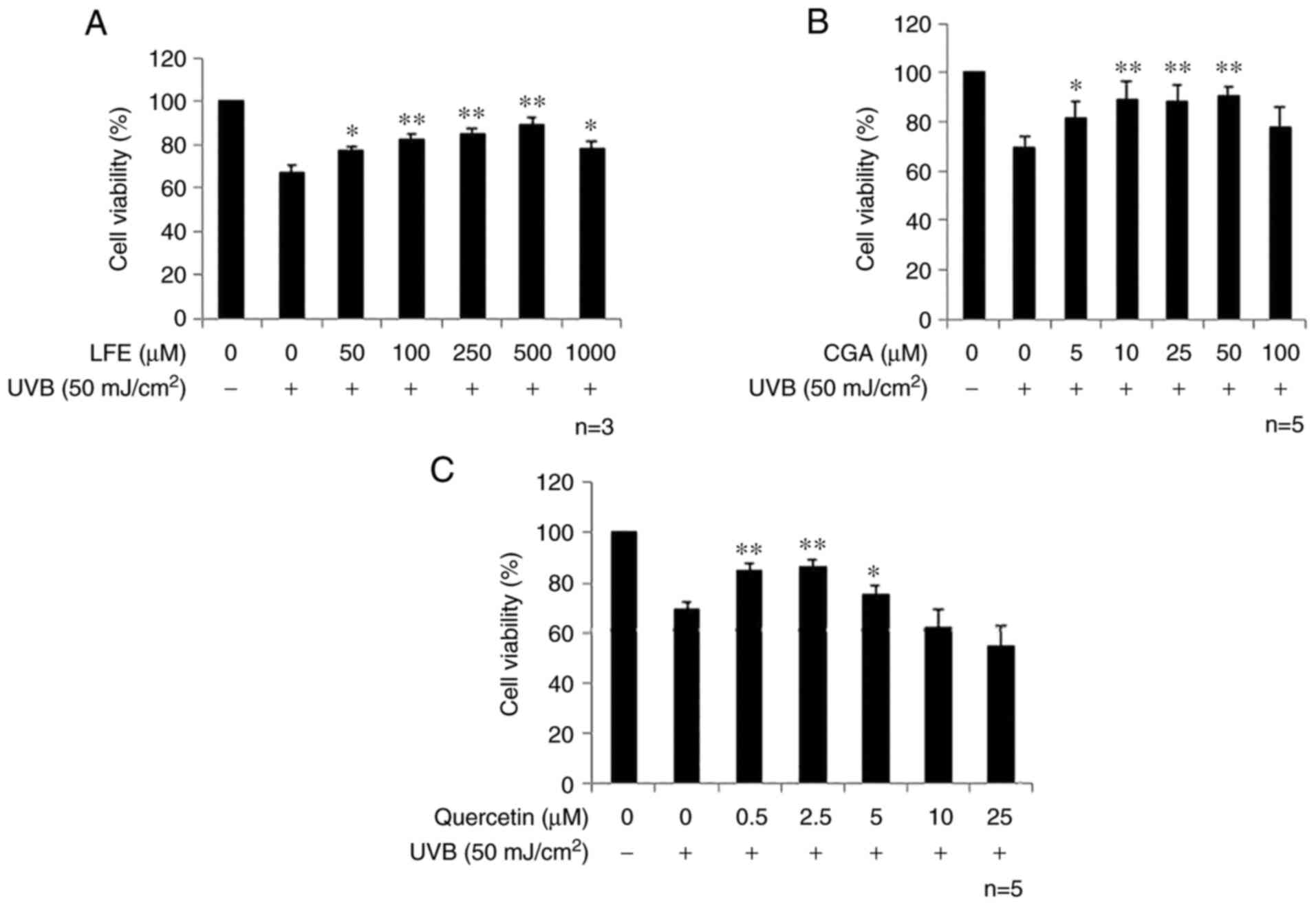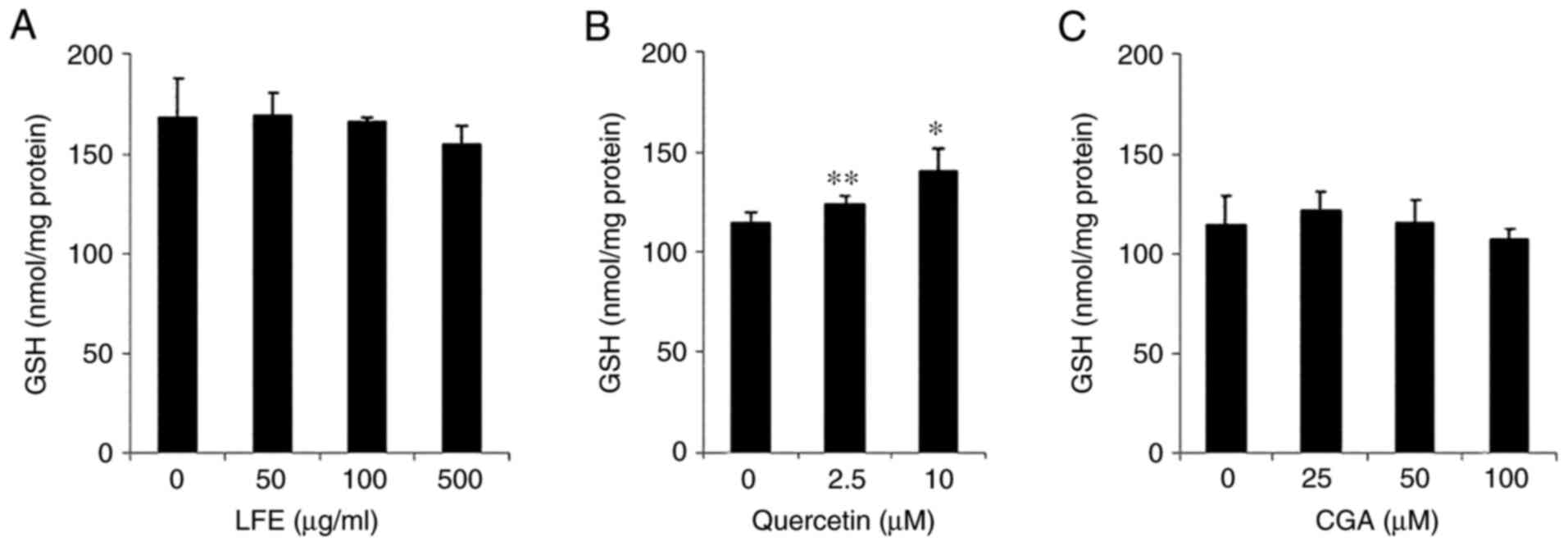|
1
|
Halliday GM, Damian DL, Rana S and Byrne
SN: The suppressive effects of ultraviolet radiation on immunity in
the skin and internal organs: Implications for autoimmunity. J
Dermatol Sci. 66:176–182. 2012.PubMed/NCBI View Article : Google Scholar
|
|
2
|
Heck DE, Gerecke DR, Vetrano AM and Laskin
JD: Solar ultraviolet radiation as a trigger of cell signal
transduction. Toxicol Appl Pharmacol. 195:288–297. 2004.PubMed/NCBI View Article : Google Scholar
|
|
3
|
Ley RD and Reeve VE: Chemoprevention of
ultraviolet radiation-induced skin cancer. Environ Health Perspect.
105 (Suppl 4):S981–S984. 1997.PubMed/NCBI View Article : Google Scholar
|
|
4
|
Yang B, Xu QY, Guo CY, Huang JW, Wang SM,
Li YM, Tu Y, He L, Bi ZG, Ji C and Cheng B: MHY1485 ameliorates
UV-induced skin cell damages via activating mTOR-Nrf2 signaling.
Oncotarget. 8:12775–12783. 2017.PubMed/NCBI View Article : Google Scholar
|
|
5
|
Martincorena I, Roshan A, Gerstung M,
Ellis P, Van Loo P, McLaren S, Wedge DC, Fullam A, Alexandrov LB,
Tubio JM, et al: Tumor evolution. High burden and pervasive
positive selection of somatic mutations in normal human skin.
Science. 348:880–886. 2015.PubMed/NCBI View Article : Google Scholar
|
|
6
|
Gunn DA, de Craen AJ, Dick JL, Tomlin CC,
van Heemst D, Catt SD, Griffiths T, Ogden S, Maier AB, Murray PG,
et al: Facial appearance reflects human familial longevity and
cardiovascular disease risk in healthy individuals. J Gerontol A
Biol Sci Med Sci. 68:145–152. 2013.PubMed/NCBI View Article : Google Scholar
|
|
7
|
Gunn DA, Larsen LA, Lall JS, Rexbye H and
Christensen K: Mortality is written on the face. J Gerontol A Biol
Sci Med Sci. 71:72–77. 2016.PubMed/NCBI View Article : Google Scholar
|
|
8
|
Sveikata K, Balciuniene I and Tutkuviene
J: Factors influencing face aging. Literature review.
Stomatologija. 13:113–116. 2011.PubMed/NCBI
|
|
9
|
Gordon JR and Brieva JC: Images in
clinical medicine. Unilateral dermatoheliosis. N Engl J Med.
366(e25)2012.PubMed/NCBI View Article : Google Scholar
|
|
10
|
Young AR, Sheehan JM, Chadwick CA and
Potten CS: Protection by ultraviolet A and B sunscreens against in
situ dipyrimidine photolesions in human epidermis is comparable to
protection against sunburn. J Invest Dermatol. 115:37–41.
2000.PubMed/NCBI View Article : Google Scholar
|
|
11
|
Kim HH, Cho S, Lee S, Kim KH, Cho KH, Eun
HC and Chung JH: Photoprotective and anti-skin-aging effects of
eicosapentaenoic acid in human skin in vivo. J Lipid Res.
47:921–930. 2006.PubMed/NCBI View Article : Google Scholar
|
|
12
|
Seite S, Fourtanier A, Moyal D and Young
AR: Photodamage to human skin by suberythemal exposure to solar
ultraviolet radiation can be attenuated by sunscreens: A review. Br
J Dermatol. 163:903–914. 2010.PubMed/NCBI View Article : Google Scholar
|
|
13
|
Hasegawa T, Nakashima M and Suzuki Y:
Nuclear DNA damage-triggered NLRP3 inflammasome activation promotes
UVB-induced inflammatory responses in human keratinocytes. Biochem
Biophys Res Commun. 477:329–335. 2016.PubMed/NCBI View Article : Google Scholar
|
|
14
|
D'Errico M, Lemma T, Calcagnile A,
Proietti De Santis L and Dogliotti E: Cell type and DNA damage
specific response of human skin cells to environmental agents.
Mutat Res. 614:37–47. 2007.PubMed/NCBI View Article : Google Scholar
|
|
15
|
Kobayashi M and Yamamoto M: Nrf2-Keap1
regulation of cellular defense mechanisms against electrophiles and
reactive oxygen species. Adv Enzyme Regul. 46:113–140.
2006.PubMed/NCBI View Article : Google Scholar
|
|
16
|
Li S, Yang H and Chen X: Protective
effects of sulforaphane on diabetic retinopathy: Activation of the
Nrf2 pathway and inhibition of NLRP3 inflammasome formation. Exp
Anim. 68:221–231. 2019.PubMed/NCBI View Article : Google Scholar
|
|
17
|
Swindells K and Rhodes LE: Influence of
oral antioxidants on ultraviolet radiation-induced skin damage in
humans. Photodermatol Photoimmunol Photomed. 20:297–304.
2004.PubMed/NCBI View Article : Google Scholar
|
|
18
|
Yimcharoen M, Kittikunnathum S, Suknikorn
C, Nak-On W, Yeethong P, Anthony TG and Bunpo P: Effects of
ascorbic acid supplementation on oxidative stress markers in
healthy women following a single bout of exercise. J Int Soc Sports
Nutr. 16(2)2019.PubMed/NCBI View Article : Google Scholar
|
|
19
|
Hanson KM and Clegg RM: Bioconvertible
vitamin antioxidants improve sunscreen photoprotection against
UV-induced reactive oxygen species. J Cosmet Sci. 54:589–598.
2003.PubMed/NCBI
|
|
20
|
Jeon HY, Kim JK, Kim WG and Lee SJ:
Effects of oral epigallocatechin gallate supplementation on the
minimal erythema dose and UV-induced skin damage. Skin Pharmacol
Physiol. 22:137–141. 2009.PubMed/NCBI View Article : Google Scholar
|
|
21
|
Puglia C, Offerta A, Saija A, Trombetta D
and Venera C: Protective effect of red orange extract
supplementation against UV-induced skin damages: Photoaging and
solar lentigines. J Cosmet Dermatol. 13:151–157. 2014.PubMed/NCBI View Article : Google Scholar
|
|
22
|
Heinrich U, Moore CE, De Spirt S, Tronnier
H and Stahl W: Green tea polyphenols provide photoprotection,
increase microcirculation, and modulate skin properties of women. J
Nutr. 141:1202–1208. 2011.PubMed/NCBI View Article : Google Scholar
|
|
23
|
Rizwan M, Rodriguez-Blanco I, Harbottle A,
Birch-Machin MA, Watson RE and Rhodes LE: Tomato paste rich in
lycopene protects against cutaneous photodamage in humans in vivo:
A randomized controlled trial. Br J Dermatol. 164:154–162.
2011.PubMed/NCBI View Article : Google Scholar
|
|
24
|
Juturu V, Bowman JP and Deshpande J:
Overall skin tone and skin-lightening-improving effects with oral
supplementation of lutein and zeaxanthin isomers: A double-blind,
placebo-controlled clinical trial. Clin Cosmet Investig Dermatol.
9:325–332. 2016.PubMed/NCBI View Article : Google Scholar
|
|
25
|
Ulbricht C, Bryan JK, Costa D, Culwell S,
Giese N, Isaac R, Nummy K, Pham T, Rapp C, Rusie E, et al: An
evidence-based systematic review of Goji Lycium spp.) by the
Natural Standard Research Collaboration. J Diet Suppl. 12:184–240.
2015.PubMed/NCBI View Article : Google Scholar
|
|
26
|
Amagase H and Farnsworth NR: A review of
botanical characteristics, phytochemistry, clinical relevance in
efficacy and safety of Lycium barbarum fruit (Goji). Food Res Int.
44:1702–1717. 2011.
|
|
27
|
Gomez-Bernal S, Rodriguez-Pazos L,
Martinez FJ, Ginarte M, Rodríguez-Granados MT and Toribio J:
Systemic photosensitivity due to Goji berries. Photodermatol
Photoimmunol Photomed. 27:245–247. 2011.PubMed/NCBI View Article : Google Scholar
|
|
28
|
Reeve VE, Allanson M, Arun SJ, Domanski D
and Painter N: Mice drinking goji berry juice (Lycium barbarum) are
protected from UV radiation-induced skin damage via antioxidant
pathways. Photochem Photobiol Sci. 9:601–607. 2010.PubMed/NCBI View Article : Google Scholar
|
|
29
|
Kuwazuru S, Nakashima M, Honda E and
Fukaya Y: Effects of oral lycii fructus extracts on skin erythema
and skin pigmentation induced by solar-simulated ultraviolet
irradiation in healthy men. Pharmacometrics. 83:39–45. 2012.
|
|
30
|
Xu W, Saiki S, Myojin T, Liu Y, Zhu B,
Murata Y, Ashida H, Tsunenaga M and Nakamura Y: Lycii fructus
extract ameliorates hydrogen peroxide-induced cytotoxicity through
indirect antioxidant action. Biosci Biotechnol Biochem.
82:1812–1820. 2018.PubMed/NCBI View Article : Google Scholar
|
|
31
|
World Medical Association. World Medical
Association Declaration of Helsinki: Ethical principles for medical
research involving human subjects. JAMA. 310:2191–2194.
2013.PubMed/NCBI View Article : Google Scholar
|
|
32
|
Fitzpatrick TB: The validity and
practicality of sun-reactive skin types I through VI. Arch
Dermatol. 124:869–871. 1988.PubMed/NCBI View Article : Google Scholar
|
|
33
|
Kobayashi S, Murakami K, Sasaki S, Okubo
H, Hirota N, Notsu A, Fukui M and Date C: Comparison of relative
validity of food group intakes estimated by comprehensive and
brief-type self-administered diet history questionnaires against 16
d dietary records in Japanese adults. Public Health Nutr.
14:1200–1211. 2011.PubMed/NCBI View Article : Google Scholar
|
|
34
|
Delalleau A, Lagarde JM and George J: An a
priori shading correction technique for contact imaging devices.
IEEE Trans Image Process. 20:2876–2885. 2011.PubMed/NCBI View Article : Google Scholar
|
|
35
|
Lim SH, Kim SM, Lee YW, Ahn KJ and Choe
YB: Change of biophysical properties of the skin caused by
ultraviolet radiation-induced photodamage in Koreans. Skin Res
Technol. 14:93–102. 2008.PubMed/NCBI View Article : Google Scholar
|
|
36
|
Ambach W and Blumthaler M: Biological
effectiveness of solar UV radiation in humans. Experientia.
49:747–753. 1993.PubMed/NCBI View Article : Google Scholar
|
|
37
|
Stahl W, Heinrich U, Aust O, Tronnier H
and Sies H: Lycopene-rich products and dietary photoprotection.
Photochem Photobiol Sci. 5:238–242. 2006.PubMed/NCBI View Article : Google Scholar
|
|
38
|
Carrascosa JM, Floriach N, Sala E and
Aguilera J: Increase in minimal erythemal dose following oral
administration of an antioxidant complex based on a mix of
carotenoids: Double-blind, placebo-controlled trial. Photodermatol
Photoimmunol Photomed. 33:284–286. 2017.PubMed/NCBI View Article : Google Scholar
|
|
39
|
Koyama YI, Kuwaba K, Kondo S and Tsukada
Y: Supplemental ingestion of collagen peptide suppresses
uitraviolet-induced erythema. Jpn Pharmacol Ther. 42:781–790.
2014.
|
|
40
|
Pengjiao Z, Juan L, Yulong C and Lijuan Z:
The structures and biological functions of polysaccharides from
traditional Chinese herbs. Prog Mol Biol Transl Sci. 163:423–444.
2019.PubMed/NCBI View Article : Google Scholar
|
|
41
|
Li H, Li Z, Peng L, Jiang N, Liu Q, Zhang
E, Liang B, Li R and Zhu H: Lycium barbarum polysaccharide protects
human keratinocytes against UVB-induced photo-damage. Free Radic
Res. 51:200–210. 2017.PubMed/NCBI View Article : Google Scholar
|
|
42
|
Ding Y, Yan Y, Peng Y, Chen D, Mi J, Lu L,
Luo Q, Li X, Zeng X and Cao Y: In vitro digestion under simulated
saliva, gastric and small intestinal conditions and fermentation by
human gut microbiota of polysaccharides from the fruits of Lycium
barbarum. Int J Biol Macromol. 125:751–760. 2019.PubMed/NCBI View Article : Google Scholar
|
|
43
|
Nakamura S, Matsui Y, Watanabe T, Kondou N
and Masukawa Y: Pharmacokinetics of chlorogenic acids absorbed in
human plasma and their metabolites following oral ingestion of
coffee. drink. 34:1239–1246. 2006.
|
|
44
|
Lafay S, Gil-Izquierdo A, Manach C, Morand
C, Besson C and Scalbert A: Chlorogenic acid is absorbed in its
intact form in the stomach of rats. J Nutr. 136:1192–1197.
2006.PubMed/NCBI View Article : Google Scholar
|
|
45
|
Renouf M, Marmet C, Giuffrida F, Lepage M,
Barron D, Beaumont M, Williamson G and Dionisi F: Dose-response
plasma appearance of coffee chlorogenic and phenolic acids in
adults. Mol Nutr Food Res. 58:301–309. 2014.PubMed/NCBI View Article : Google Scholar
|
|
46
|
Kitagawa S, Yoshii K, Morita SY and
Teraoka R: Efficient topical delivery of chlorogenic acid by an
oil-in-water microemulsion to protect skin against UV-induced
damage. Chem Pharm Bull (Tokyo). 59:793–796. 2011.PubMed/NCBI View Article : Google Scholar
|
|
47
|
Yang J, Qian D, Jian S, Shang EX, Guo J
and Duan JA: Identification of rutin deglycosylated metabolites
produced by human intestinal bacteria using UPLC-Q-TOF/MS. J
Chromatogr B Analyt Technol Biomed Life Sci. 898:95–100.
2012.PubMed/NCBI View Article : Google Scholar
|
|
48
|
Erlund I, Kosonen T, Alfthan G, Mäenpää J,
Perttunen K, Kenraali J, Parantainen J and Aro A: Pharmacokinetics
of quercetin from quercetin aglycone and rutin in healthy
volunteers. Eur J Clin Pharmacol. 56:545–553. 2000.PubMed/NCBI View Article : Google Scholar
|
|
49
|
Vicentini FT, He T, Shao Y, Fonseca MJ,
Verri WA Jr, Fisher GJ and Xu Y: Quercetin inhibits UV
irradiation-induced inflammatory cytokine production in primary
human keratinocytes by suppressing NF-kappaB pathway. J Dermatol
Sci. 61:162–168. 2011.PubMed/NCBI View Article : Google Scholar
|
|
50
|
Zhu X, Li N, Wang Y, Ding L, Chen H, Yu Y
and Shi X: Protective effects of quercetin on UVB
irradiationinduced cytotoxicity through ROS clearance in
keratinocyte cells. Oncol Rep. 37:209–218. 2017.PubMed/NCBI View Article : Google Scholar
|
|
51
|
Gueniche A, Philippe D, Bastien P, Blum S,
Buyukpamukcu E and Castiel-Higounenc I: Probiotics for
photoprotection. Dermatoendocrinol. 1:275–279. 2009.PubMed/NCBI View Article : Google Scholar
|
|
52
|
Bouilly-Gauthier D, Jeannes C, Maubert Y,
Duteil L, Queille-Roussel C, Piccardi N, Montastier C, Manissier P,
Piérard G and Ortonne JP: Clinical evidence of benefits of a
dietary supplement containing probiotic and carotenoids on
ultraviolet-induced skin damage. Br J Dermatol. 163:536–543.
2010.PubMed/NCBI View Article : Google Scholar
|
|
53
|
Gueranger Q, Li F, Peacock M,
Larnicol-Fery A, Brem R, Macpherson P, Egly JM and Karran P:
Protein oxidation and DNA repair inhibition by 6-thioguanine and
UVA radiation. J Invest Dermatol. 134:1408–1417. 2014.PubMed/NCBI View Article : Google Scholar
|
|
54
|
Hakozaki T, Date A, Yoshii T, Toyokuni S,
Yasui H and Sakurai H: Visualization and characterization of
UVB-induced reactive oxygen species in a human skin equivalent
model. Arch Dermatol Res. 300 (Suppl 1):S51–S56. 2008.PubMed/NCBI View Article : Google Scholar
|
|
55
|
Hasegawa T, Shimada S, Ishida H and
Nakashima M: Chafuroside B, an Oolong tea polyphenol, ameliorates
UVB-induced DNA damage and generation of photo-immunosuppression
related mediators in human keratinocytes. PLoS One.
8(e77308)2013.PubMed/NCBI View Article : Google Scholar
|
|
56
|
Amagase H, Sun B and Borek C: Lycium
barbarum (goji) juice improves in vivo antioxidant biomarkers in
serum of healthy adults. Nutr Res. 29:19–25. 2009.PubMed/NCBI View Article : Google Scholar
|
|
57
|
Moon HW, Park JW, Lee KW, Jeong HC, Choi
JB, Choi SW, Bae WJ, Cho HJ, Ha US, Hong SH, et al: Administration
of Goji (lycium chinense mill.) extracts improves erectile function
in old aged rat model. World J Mens Health. 35:43–50.
2017.PubMed/NCBI View Article : Google Scholar
|
|
58
|
Fukushima Y, Takahashi Y, Hori Y,
Kishimoto Y, Shiga K, Tanaka Y, Masunaga E, Tani M, Yokoyama M and
Kondo K: Skin photoprotection and consumption of coffee and
polyphenols in healthy middle-aged Japanese females. Int J
Dermatol. 54:410–418. 2015.PubMed/NCBI View Article : Google Scholar
|
|
59
|
Fukushima Y, Tashiro T, Kumagai A,
Ohyanagi H, Horiuchi T, Takizawa K, Sugihara N, Kishimoto Y,
Taguchi C, et al: Coffee and beverages are the major contributors
to polyphenol consumption from food and beverages in Japanese
middle-aged women. J Nutr Sci. 3(e48)2014.PubMed/NCBI View Article : Google Scholar
|
|
60
|
Wang P, Sun M, Ren J, Aslam MN, Xu Y,
Fisher GJ, Voorhees JJ, Wang X and Li Y: Dietary fish oil
supplementation enhances expression of genes involved in cornified
cell envelope formation in rat skin. J Invest Dermatol.
138:981–983. 2018.PubMed/NCBI View Article : Google Scholar
|


















